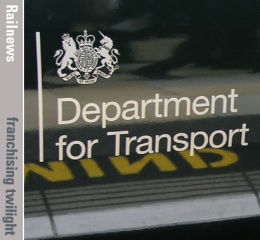Posted 14th October 2019 | 3 Comments
Rail franchising set to face the axe in 2020

Updated 08.15
THE passenger rail franchising system set up as part of privatisation in the 1990s is set to be abolished, as one of the measures to be announced in the Queen’s Speech today.
In advance of the State Opening of Parliament, the government has revealed that it wants to scrap rail franchising, replacing it by a model focused on ‘performance and reliability’.
The Sunday Telegraph says a ‘revolutionary’ overhaul of the railways can be expected next year.
Further details will probably have to await proposals from the Department for Transport, which is also due to publish the outcome of the Williams Review in the next few weeks. Keith Williams has already said that the present system ‘cannot continue in the way that it is today. It is no longer delivering clear benefits for either taxpayers or farepayers’.
TSSA general secretary Manuel Cortes said: ‘Anything that falls short of full public ownership of our railways amounts to tinkering at the edges. The British travelling public have had enough of franchising – full stop.
‘Frankly, you don't need to be a rocket scientist to know that the system by which our railways are run is broken well beyond repair. I would urge Johnson to fully engage with the problem.
‘Reform of the franchising model is not what’s needed – we need plans for the future of our industry which puts passengers before profit.’
RMT general secretary Mick Cash is also critical. He said: ‘Private operation of our railways is incompatible with reliable and high quality services, lower fares and investment in infrastructure as the train companies will always suck the life blood out of the system in profits and dividends. That is a cold hard fact.
‘Trying to repackage the racket of franchising for political purposes will fail. Ruling out the public sector option exposes the whole policy for the sham that it is. We need a nationalised railway where quality, investment, planning and safety come first.’
The first franchises were awarded in late 1995, and the first franchised train to run was operated by South West Trains early on the morning of 4 February 1996.
Since then franchises have had mixed fortunes, because although many did well several failed. Virgin Trains East Coast was the most recent to collapse, and its operations were handed over to state-owned LNER in June 2018.
However, although railway reform is expected to be included in today’s Queen Speech, it will also depend on a vote in favour of the speech by MPs, which is not necessarily certain.
Reader Comments:
Views expressed in submitted comments are that of the author, and not necessarily shared by Railnews.

David Cook, Broadstone, Dorset
From a passenger point of view, I have never had a problem with any of the actual trains run under the franchising system. Most of the problems have been delays caused by signal failures/power supply failures/points failures/strikes/suicides/weather related problems. None of those would have been solved by changing operator or doing away with franchises as those problems were pretty well all out of the control of the franchise operator. Even the ironing board seats on the GWR IEP's were nothing to do with GWR but some idiot in a back office that decided something that feels like 2mm of padding would be fine on a 3 hour journey from Paddington to Plymouth. I almost look forward to engineering works so I can sit back and enjoy the comfort of the rail replacement coaches on some of my journeys..........
king arthur, Buckley
It's also a cold hard fact that the state sucked the life blood out of the rail network during the days of BR. Privatisation has provided better trains, stations and more services; I don't think anyone would welcome a return to what was on offer in the 70s and 80s.
david c smith, Bletchley
The key to this question, to my mind, is the willingness to treat passenger rail on a "horses for courses" basis. Franchising ( and Concessioning ) is quite appropriate applied to local , particularly commuter, operations, with franchises / concessions given by local, direct - democracy bodies, giving more direct accountability.
But intercity / longer distance operations could gain better accountability through on- rail, ongoing , open - access competition, as recommended by the recent Competition and Markets Authority report's Option 4.